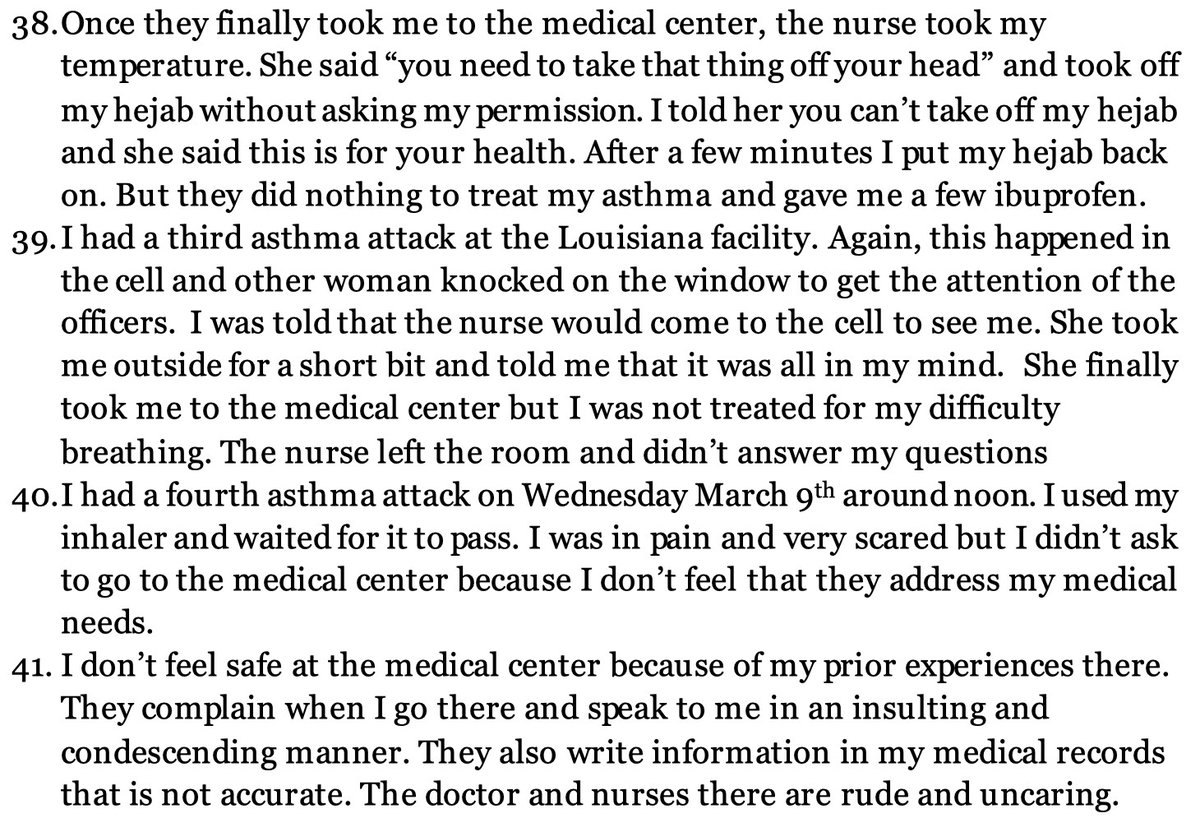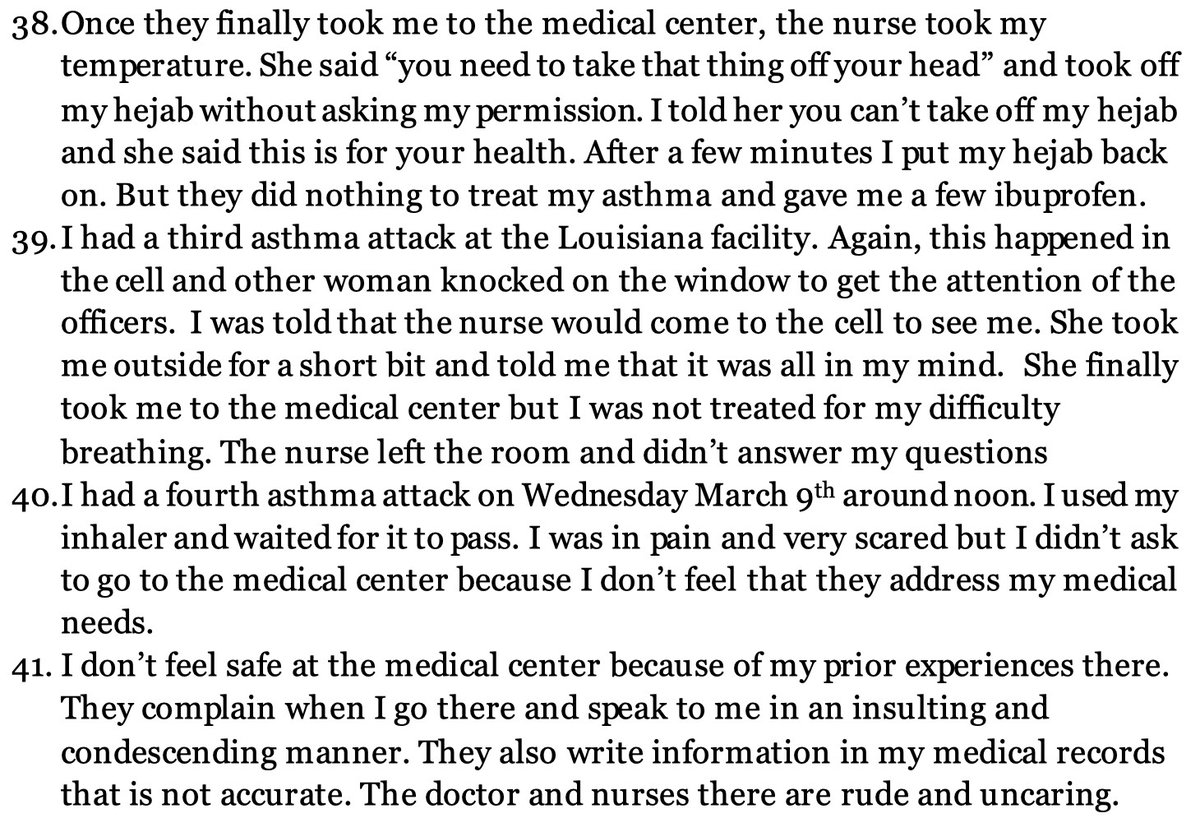ICE Custody Crisis: Nurse Rips Hijab, Asthma Attacks Ignored!
Rümeysa Öztürk’s Disturbing Experience in ICE Custody
In a troubling account shared by Rümeysa Öztürk, a detainee in U.S. Immigration and Customs Enforcement (ICE) custody, she reveals the harrowing conditions faced by individuals with medical issues while in detention. Öztürk, who suffers from asthma, reported enduring four painful asthma attacks during her time in ICE custody, highlighting the inadequate medical attention provided to detainees. This situation raises significant concerns about the treatment of vulnerable populations within the immigration system.
Medical Neglect in Detention Centers
Öztürk’s testimony sheds light on the alarming reality of medical neglect in detention centers. She claims that her asthma went untreated, exacerbating her condition and leading to severe attacks. The lack of timely and appropriate medical care for detainees is a pressing issue that many human rights advocates highlight. Asthma, a chronic respiratory condition, can be life-threatening if not managed properly, and the repercussions of neglecting such health issues can be dire.
Cultural Insensitivity and Disrespect
Adding to her distressing account, Öztürk described a particularly invasive and disrespectful incident where a nurse forcibly removed her hijab, stating, "You need to take that thing off your head." This act not only reflects a lack of cultural sensitivity but also raises serious questions about the treatment of individuals who wear religious garments. Such actions can lead to feelings of humiliation and trauma, aggravating the already difficult experiences faced by detainees. The need for cultural competency training among detention center staff is imperative to ensure that all individuals are treated with dignity and respect.
The Importance of Advocacy
Öztürk’s story is a poignant reminder of the critical role that advocacy plays in addressing the rights of detainees. Human rights organizations and activists have long campaigned for better treatment of individuals in ICE custody, emphasizing the need for medical care, mental health support, and respect for cultural practices. Advocacy efforts are essential in bringing attention to these issues and pushing for reforms within the immigration system to ensure that the rights of detainees are upheld.
- YOU MAY ALSO LIKE TO WATCH THIS TRENDING STORY ON YOUTUBE. Waverly Hills Hospital's Horror Story: The Most Haunted Room 502
The Broader Context of ICE Detention
The experiences of Rümeysa Öztürk are not isolated incidents but part of a broader narrative surrounding ICE detention centers. Reports of inadequate medical care, abuse, and neglect have emerged from various facilities across the country, leading to widespread condemnation from human rights groups. The conditions in these centers often exacerbate existing health issues and can lead to life-altering consequences for detainees. The urgency for reform in the immigration detention system has never been more critical.
Impact on Mental Health
The psychological toll of being in ICE custody, especially for individuals with pre-existing health conditions, is profound. The stress of confinement, coupled with inadequate medical care and cultural insensitivity, can lead to significant mental health challenges. Detainees often report feelings of anxiety, depression, and hopelessness, which can further complicate their health issues. Understanding the mental health needs of individuals in detention is crucial for providing holistic care and support.
Call for Policy Change
Rümeysa Öztürk’s account underscores the need for urgent policy changes within ICE and the broader immigration system. Policymakers must prioritize the health and well-being of all individuals in custody, ensuring that they receive the necessary medical attention and are treated with respect. Comprehensive reforms should include regular assessments of medical care standards in detention facilities and the implementation of training programs for staff to promote cultural sensitivity and awareness.
Conclusion
The distressing experiences recounted by Rümeysa Öztürk highlight the urgent need for systemic change within ICE detention centers. As advocates continue to fight for the rights of detainees, it is essential that stories like Öztürk’s are amplified to bring attention to the pressing issues of medical neglect and cultural insensitivity. The treatment of individuals in the immigration system reflects broader societal values, and it is imperative that we advocate for a system that prioritizes dignity, respect, and comprehensive care for all.
As we reflect on Öztürk’s experience, let it serve as a catalyst for action—prompting conversations and inspiring efforts aimed at reforming the immigration detention system to ensure that no one suffers in silence and that the rights of every individual are recognized and upheld.

Rümeysa Öztürk says she’s had 4 painful asthma attacks in ICE custody, and not only is her asthma going untreated but a nurse tore off her hijab, saying, “You need to take that thing off your head.” pic.twitter.com/czTCmYSXtQ
— Pablo Manríquez (@PabloReports) April 11, 2025
Rümeysa Öztürk’s Asthma Attacks in ICE Custody
Rümeysa Öztürk’s experience in ICE custody has brought to light serious concerns regarding the treatment of individuals with medical needs in detention centers. She reports having suffered from four painful asthma attacks while in custody. This situation not only highlights the inadequacies of medical care provided in such facilities but also raises questions about the treatment of cultural and religious identities.
Untreated Asthma in Detention
Asthma is a chronic respiratory condition that can lead to severe complications if not appropriately managed. Rümeysa Öztürk’s claims that her asthma went untreated during her time in ICE custody is alarming. It is vital for every individual, especially those in detention, to receive timely medical care. According to the CDC, untreated asthma can lead to serious health risks, including hospitalization and even death. How can we, as a society, allow anyone to suffer in such a way?
The Incident with the Nurse
Adding insult to injury, Rümeysa recounts a particularly distressing incident where a nurse ripped off her hijab, telling her, “You need to take that thing off your head.” This action not only disregards her personal identity but also shows a lack of respect for her cultural beliefs. The news/immigrants-rights/how-ice-violates-the-human-rights-of-people-in-detention/”>ACLU has long documented instances of mistreatment in ICE facilities, and this incident seems to be another example of how individuals are not treated with the dignity they deserve.
The Broader Context of Medical Negligence
Rümeysa’s story opens up a broader conversation about medical negligence in detention centers. Reports have surfaced indicating that many detainees face similar challenges, from untreated medical conditions to inadequate mental health support. The Human Rights First reports that medical neglect is a pervasive issue that needs immediate attention. When individuals are stripped of their basic rights, it’s not just a personal tragedy; it becomes a systemic failure.
Impact on Mental Health
Facing asthma attacks without treatment can lead to anxiety and fear, which can severely impact mental health. For someone like Rümeysa, who is already in a vulnerable position, this can be particularly detrimental. Mental health issues can arise from the stress of being in custody, compounded by the lack of medical care. The National Institute of Mental Health emphasizes the importance of mental well-being, especially for those experiencing chronic health conditions. It’s crucial for facilities to recognize the importance of a holistic approach to health that includes both physical and mental care.
Human Rights and Cultural Sensitivity
The incident involving Rümeysa’s hijab is a stark reminder of the need for cultural sensitivity in healthcare settings. Healthcare providers should be trained to understand and respect the cultural and religious beliefs of their patients. The World Health Organization stresses that respect for cultural practices is essential in delivering effective healthcare. When healthcare providers fail to recognize these aspects, it can lead to further trauma for already vulnerable individuals.
The Importance of Advocacy
This situation calls for increased advocacy for the rights of individuals in detention. Organizations such as the National Immigration Law Center work tirelessly to ensure that the rights of immigrants are upheld. They emphasize the need for systemic changes in how ICE facilities operate, particularly regarding healthcare and human rights. Grassroots movements and public awareness can lead to significant changes, and it’s up to us to stand up for those who cannot advocate for themselves.
Call for Reform
The experiences of individuals like Rümeysa Öztürk underline the urgent need for reform within ICE and similar detention facilities. No one should have to endure untreated medical conditions or face disrespect regarding their cultural identity. Advocating for better healthcare policies and training for medical staff in these settings is crucial. By fostering an environment of respect and care, we can help prevent these types of incidents from occurring in the future.
Community Support and Awareness
Community awareness can play a vital role in advocating for the rights of detainees. Sharing stories like Rümeysa’s can help shed light on the injustices faced by individuals in ICE custody. Social media platforms provide a powerful tool for raising awareness and mobilizing support. By amplifying these voices, we can create a collective push for change.
Conclusion: A Call to Action
Rümeysa Öztürk’s experience should serve as a wake-up call for all of us. It’s time to demand better treatment for individuals in ICE custody, particularly when it comes to healthcare and cultural respect. As we learn about these injustices, let’s use our voices to advocate for change. Everyone deserves to be treated with dignity and respect, regardless of their circumstances.

